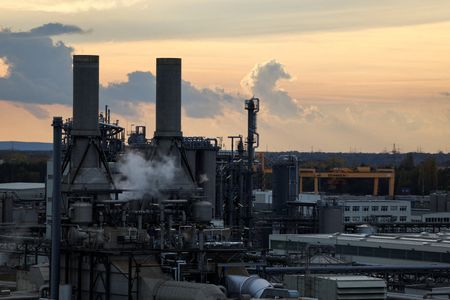By Julia Payne
BRUSSELS (Reuters) -The European Commission will work with EU member states and the chemicals sector to support production of chemicals identified as critical for Europe’s industrial supply chains, the EU executive said on Tuesday.
It said it will establish later this year a Critical Chemical Alliance, bringing together the Commission, member states, and various stakeholders as part of a wider plan to revive Europe’s chemicals industry
The chemical alliance will “identify critical production sites needing policy support and tackle trade issues like supply chain dependencies and distortions,” the Commission said in a statement.
The move mirrors another alliance set up to identify metals and minerals key for the energy transition. The EU then set targets for mining, processing and recycling of 17 strategic materials.
Chemicals are a fundamental input for nearly all industries from textiles and defence to tech and account for 1.2 million direct jobs in the EU. However, chemical production plunged during the COVID-19 pandemic and it has not fully recovered in the face of competition with U.S. and Chinese rivals that benefit from significantly cheaper energy and production costs.
Commission officials said more than 20 chemical sites have closed over the last two years, with petrochemicals and ammonia “under severe pressure”.
“First and foremost, there is the issue of sovereignty: keeping our steam crackers,” European Commission Executive Vice President and industry commissioner Stephane Sejourne told reporters.
Steam crackers, a unit in petrochemical plants, produce building block chemicals ethylene and propylene, which are used in everything from plastic food packaging and rubber to car headlights and fleece hoodies. The EU has around 40 steam crackers.
On Monday, chemicals giant Dow said it planned to shut two plants in Germany and one in Britain over the next two years.
Sejourne told reporters the alliance would evaluate the bloc’s dependence on imports in the context of the importance of the molecule.
“We are 80% dependent on foreign imports for methanol, for example, and if we look at the critical production sites, we need to safeguard and retain European sovereignty… Work will be done to identify these molecules, and the plan proposes to move forward on a kind of Critical Molecules Act.”
Further, the Commission will include chemicals in future trade agreements and strengthen surveillance of chemical imports. The Commission has already opened 18 trade defence investigations into different molecules since 2024.
To compensate for high energy prices, the Commission will expand state aid, speed up permitting and provide energy guarantees from EU funds. The Commission will also include EU-content criteria in public procurement for chemicals, an effort being promoted across EU industries, Sejourne said.
Finally, the Commission will present its sixth simplification package, known as an omnibus, for the chemicals industry. The omnibus, due to be proposed before the year end, will simplify rules on labelling of dangerous chemicals as well as revise rules around cosmetics and fertilizers adding up to savings of 363 million euros ($425.47 million) a year.
($1 = 0.8532 euros)
(Reporting by Julia Payne and Milan StrahmEditing by Tomasz Janowski)








